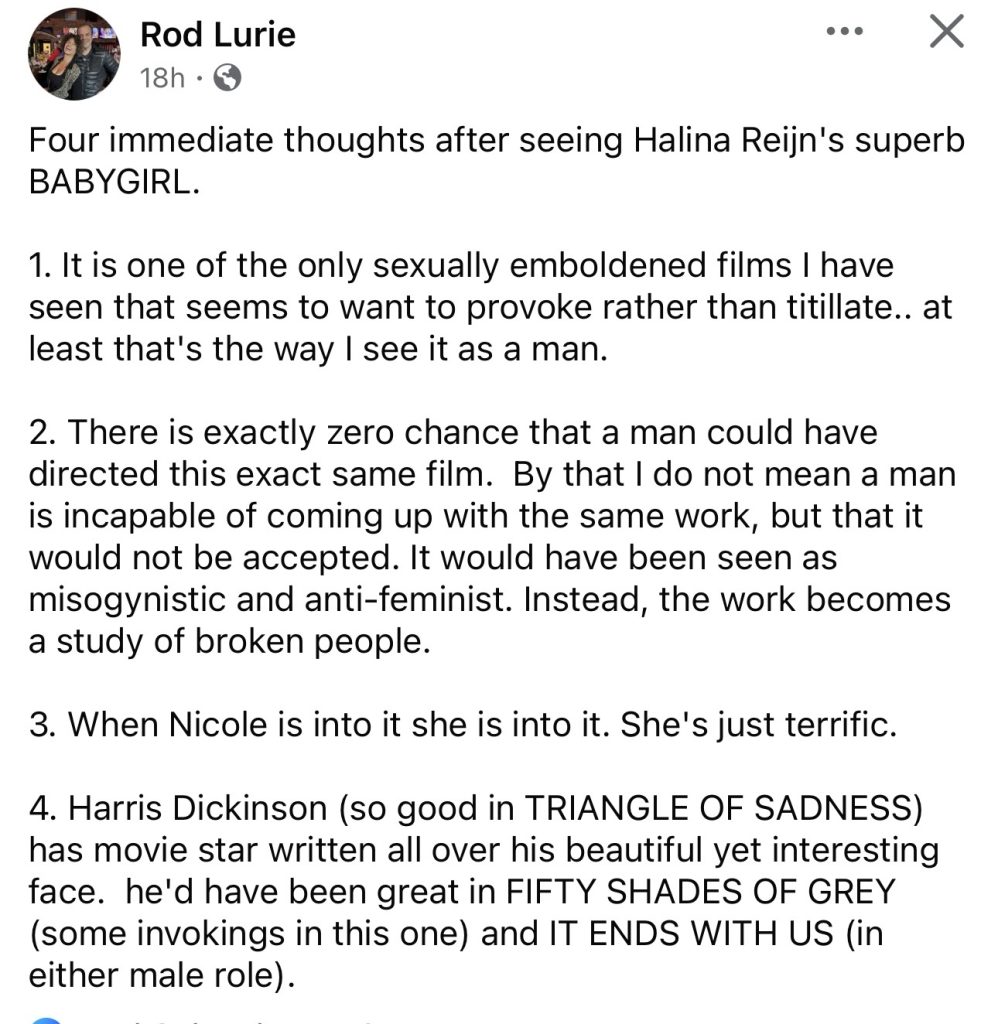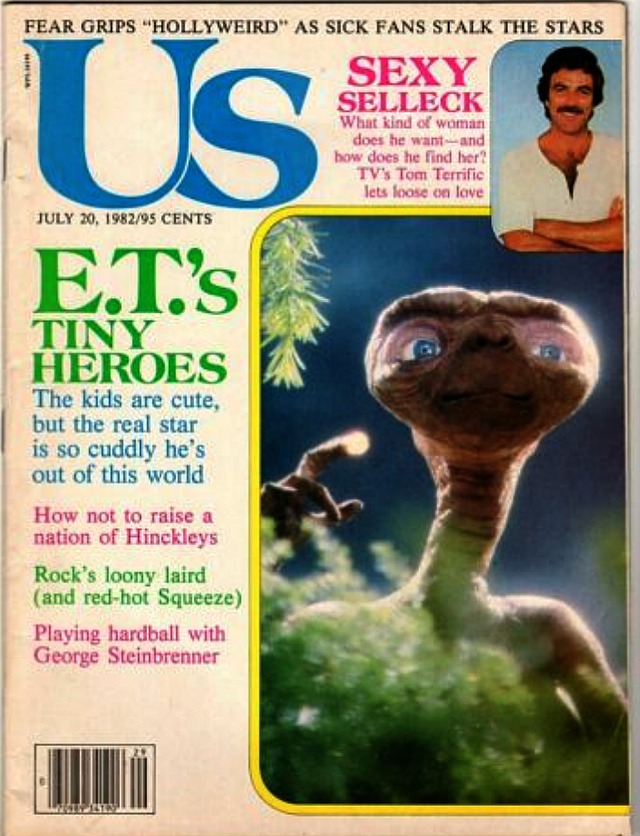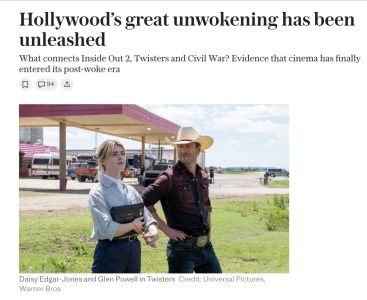When it comes to Babygirl (A24, 12.25), HE and Rod Lurie park their cars in the same garage.

I’m feeling very affected by this. Seven-year-old Drew Barrymore reminds me a bit of Sutton, who’s just turned three. I love that Carson spent the first 60-plus seconds settling her nerves about having fallen and soothing any slight embarrassment she might have been feeling. A good interviewer always shows respect and restraint, but allows feelings of affection to leak out if they naturally surface [go to 7:53].
In late May of ’82 I did an Us magazine group interview with Drew, Henry Thomas (who was 10) and Robert MacNaughton (then 15).
I remember being told by my Us editor, Stephen Schaefer, that a decision had been made by Universal publicists and magazine editors alike to concentrate on Henry and Drew and downplay poor Robert. “But he’s so good in the film!,” I replied, feeling a bit sorry for the guy. That may be true, I was told, but he’s too old and not cute enough — the story will be about Henry and Drew.
The piece was called “E.T.’s Tiny Heroes,” and it turned out to be a cover (my first). The issue date was 7.20.82.
Richard Attenborough‘s Gandhi won the 1982 Best Picture Oscar. Because it said something important and politically correct about social issues, human rights and whatnot. E.T. should have won for the simple, undisputed fact that it’s a much better film that Gandhi…much. Yes, some of it feels emotionally heavy-handed, but I’m suddenly seized by an impulse to watch it again.
I ran into Drew again in ’99 at that Sunset Marquis bar (Bar 1200) — she and Luke Wilson were parked at a table, and I sat down for a chat.
Drew will hit 50 on 2.22.25 — less than three months hence. Henry Thomas turned 50 three years ago — 9.9.21.


“Anybody here seen my friend Martin? / Can you tell me where he’s gone? / He freed a lot of people, but it seems good they’re dyin’ / You know I just looked around and he’s gone.”
The “it seems good they’re dyin'” is repeated four times in “Abraham, Martin and John,” a 1968 hit from Dion (still with us!) and songwriter Dick Holler.
For decades I never quite understood why Dion felt it was good on some level that all the freed people were dyin’. I didn’t think that was the actual lyric, of course, because it didn’t make a lick of sense. Nonetheless I had no alternative and that’s how I sang it for years.
A few days ago I took the time to read Holler’s lyrics and realized that the line goes as follows: “He freed a lotta people but it seems the good they die young.”
What? That’s absurdly ungrammatical on Dion’s part. “The good” and “they” are the same things. Clumsy. A grammatical way to sing it would be to pronounce the first “the” (right before “good”) and then omit the “they” and make it “it seems the good die young.”
I can’t be the only listener who thought he was singing “it seems good they’re dyin’.”
Robert Harris‘s “Conclave” was published on or about 12.1.16 — almost exactly eight years ago. Earlier that year Luca Guadagnino‘s A Bigger Splash, which costarred Ralph Fiennes as a free-spirited, middle-aged Dionysian and who eight years later would topline as a reverent, somber-minded cardinal in Edward Berger‘s film version of Conclave, opened in theatres and sorta kinda flopped.
From “Much Better Splash Than Expected — Perverse, Noirish, High-Style, Sensual,” an HE review posted on 4.11.16.
“The undercurrent of A Bigger Splash is gently mesmerizing, and that was enough for me. I can’t wait to see it again, or more precisely go there again. I felt like I was savoring a brief vacation. I’m not saying the dramatic ingredients are secondary, but they almost are.
“You feel so nicely brought along by Yorick Le Saux‘s sun-speckled afternoon cinematography and Walter Fasano‘s disciplined cutting, and by the nostalgic Stones vibe (there’s a lip-synch dance sequence that made me fall in love all over again with ‘Emotional Rescue’) and especially by Ralph Fiennes’ giddy-ass, run-at-the-mouth, rock-and-roll madman performance that I was going ‘wow, I almost don’t even care what may or may not happen in this thing.
“Well, I did as far as the plot unfolded. When the heavy-ass, third-act complications arrived I was…well, not uninterested. They’re definitely intriguing as far as they go, especially when the law steps in and starts asking questions. But I just liked being there.”
Posted on 4.12.16: There’s a kick-in-the-pants sequence in Luca Guadagnino‘s A Bigger Splash that uses the Rolling Stones’ “Emotional Rescue.” Sing it, feel it…infectious. But it brought back a misheard-lyrics issue from way back. Go online and the song ostensibly begins as follows:
“Is there nothing I can say, nothing I can do?
Change your mind. I’m so in love with you.
You’re too deep in, you can’t get out.
You’re just a poor girl in a rich man’s house.”
I’ve never heard “too deep in.” Idiotic as it sounds, I’ve always heard “bootie bear.” Here’s how the opening stanza sounds to my ears:
“Is there nuttin’ I can say, nuttin’ I can do?
Change yo’ mind. Ahm so in love wit you.
Bootie bear, yuh can’t get out.
You’re just a poor girl…rich man’s house.”
All these years I’ve told myself that “bootie bear” was a romantic nickname that the guy had given the girl in question. People do this. A girlfriend from the mid ’80s used to call me “huggie bear” so it’s not that crazy.
Eleven days ago a N.Y. Times headline severely traumatized the wokeys and pretty much sent them into a tailspin. Diversity Stalinists lamenting from coast to coast…”oh, noooo!”…and all of it stemming from a single impact-grenade piece by Kabir Chibber.
And then came Robbie Collin’s similar Telegraph story — “Hollywood’s great unwokening has been unleashed.” Excerpt: “Loath as I am to give the w-word an airing, there’s no avoiding it here: 2024 was the year in which Hollywood began to move into its post-woke era.”

The tide has turned, ayeholes! Sanity and proper proportion are being restored.




I’m finally about to sit through Pablo Larrain ‘s Maria (Netflix, 12.11) which I blew off seeing during last September’s Telluride Film Festival.
Reviews have been middling to mediocre, and I just know it’s going to sap my spirit and send me into the doldrums.
In my eyes, ears and soul the first two of Larrain’s feminist dramas — Jackie and Spencer — were torture to sit through, and it’ll be a miracle if I wind up being pleasantly surprised by Maria.
Later today I’m also going to sit through Part Two of The Brutalist, and I guess I’m kind of wondering how the…uhm, violation scene will be handled.




